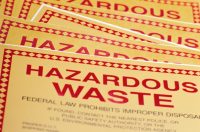Tag: Environmental Compliance
LDR Notifications
PCB Marking Requirements
Each of the following items must be marked with the large label as illustrated in this section. Where the large PCB mark is specified, but the PCB article or PCB equipment is too small to accommodate the smallest permissible size of the large mark, the small PCB mark may be used instead of the large […]
Lamp Recycler Fined for PCB Violations
According to EPA, the facility is permitted under the Toxic Substances Control Act (TSCA) to manage and store PCB wastes. Separate permits allow the facility to recycle fluorescent lamps and ballasts, batteries, electronic wastes, and mercury devices. The facility also manages non-PCB ballasts, phosphorous powders, aerosol cans, and mercury-containing wastes. The company operates facilities in […]
14 Expert Tips for Responding to NOVs and Enforcement Orders
Have a procedure in place for responding to NOVs, enforcement orders, and other related issuances. Give a copy of an NOV or order to the person responsible for responding. If the alleged violation is significant, make sure to alert the proper management official. Immediately determine the validity of the NOV or order. Mark all documents […]
$25,000 for Failing to Report Oil Spill
MassDEP received a telephone report from an environmental cleanup contractor on behalf of the building owner that a release estimated to be 260 gal of diesel fuel had occurred 6 days earlier during the transfer of oil from a basement tank to a rooftop generator when a pump had failed to cycle off. The oil […]
LPG Odorants in Rail Tank Cars
But in what appears to be a regulatory lapse, the federal odorant standards overseen by the Department of Transportation’s Federal Railroad Administration (FRA) apply only to LPG rail shipments in cargo and portable tank containers; there is no comparable regulation for LPG transported in railroad tank cars. In a safety advisory issued April 2012, the […]
Private Drinking Water Wells
Contaminants Groundwater that supplies wells can contain naturally occurring minerals (e.g., arsenic, boron, selenium, or radon). Also, almost all private wells are in rural areas where agriculture occurs. A wide variety of farming activities can affect groundwater that supplies wells. These include the use of pesticides, overuse of fertilizers and animal manure, and discharges from […]
New Product: TRAC360 for SPCC
We are proud to announce the launch of a new Spill Prevention, Control and Countermeasure solution to our TRAC360 workflow tools.


